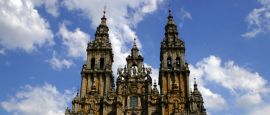Santiago’s glorious cathedral warms the spirit as soon as you glimpse its majestic baroque facade in mossy granite. This twin-towered city emblem was created by the Santiago-born architect Fernando de Casas y Novoa, who superimposed it on the original Romanesque plan of the basilica. Just inside is the Pórtico da Gloria, a masterpiece of Romanesque sculpture that once opened onto the square with almost 200 sculptures of Galician granite, dating from 1188.
Look for the finger holes worn into the stone over the years by pilgrims who, giving thanks at the end of their lengthy journey, prayed with the fingers of one hand pressed into the roots of the Tree of Jesse, below St James. From here, the great nave opens towards the chancel and the monumental baroque high altar, below which lie the relics of St James, in a Roman mausoleum. The crossing lantern houses the suspension mechanism for the botafumeiro. This is a huge baroque censer whose pendulum swings down the entire length of the transepts during special ceremonies, creating an awe-inspiring spectacle.








 You know where
You know where